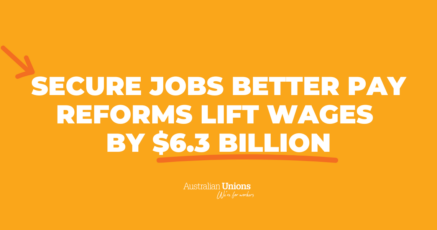In just over one week, millions of workers across Australia will start to see a boost to their pay packets and increased safety in their workplaces.
And it’s thanks to the hard work of thousands of union members – across a number of campaigns – that change is coming.
The best part? Many workers will be up for receiving a financial boost in more ways than one.
1. Minimum and award wages are going up
Every year, the Fair Work Commission reviews the National Minimum Wage and award wages to decide if they should be increased.
And every year, it is the union movement who are the biggest voice for working people; submitting a claim for a fair increase that reflects the value of work and keeps up with the cost-of-living.
This year, we won an increase of 3.75%.
This increase will apply not only to workers who rely on the minimum wage (whose hourly wage will rise to $24.10), but also those who rely on award wages: 20% of all Australian workers in total.
(If you’re on an agreement, you may also be entitled to an increase: remember, the base pay rate in a registered agreement can’t be less than the base pay rate in the relevant award.)
This increase will apply from the first full pay period starting on or after 1 July – so check your payslips to ensure you’re receiving every dollar you’re entitled to!
2. Cost-of-living tax bonus
The Albanese government’s tax-cut plan, coming in on 1 July, will provide every Australian worker with a cost-of-living bonus.
For example, a worker on average annual earnings of $72,753 will get a $1,498 tax cut. That’s an extra $28 in their pocket each week.
(This is a huge difference from the Coalition’s original tax plan, which gave the biggest benefits to the top 10% of earners).
You can use our calculator to work out how much your cost-of-living bonus will be – all you need to know is how much you earn per year.
3. Energy relief
The Albanese government’s Budget includes a $300 energy bill relief payment to every Australian household. The rebate will be applied as four $75 quarterly credits from July 1, across the next financial year.
4. Superannuation increase
Thanks to the union-won Superannuation Guarantee, all employers in Australia must provide contributions to your super that are minimum 11% of your ordinary earnings. These contributions are paid on top of your regular wages.
That percentage amount has been increasing over the past few years, and is set to increase again on 1 July to 11.5% (it will then increase again to 12% on 1 July 2025).
These incremental increase will go a huge way in helping workers retire with thousands more, and enjoy a dignified, secure retirement.
With union-won pay day super not coming in effect until 1 July 2026 (when your employer must legally pay your super at the same time as when you are paid wages), make sure to be regularly checking that your payslips match what is going into your super fund!
The super contribution caps (how much in extra contributions you can personally make to your super fund per year) are also set to rise on July 1.
5. Paid Parental leave improvements
Thanks to a campaign run by union members, Australia’s PPL scheme is improving! The key changes from 1 July are:
- An increase in leave from 20 weeks to 22 weeks (this will rise again to 24 weeks on 1 July 2025 and then to 26 weeks on 1 July 2026).
- An increase in the rate of pay (this is tied to the National Minimum Wage, which is increasing to $915.90 per week).
6. Engineered stone banned
Thanks to unionists and the advocacy of affected workers, doctors, public health experts and safety specialists, a complete ban on engineered stone will be coming into effect on 1 July.
Workers who cut, grind and drill engineered stone are at high risk of inhaling respirable crystalline silica (RCS) and developing silicosis and other severe lung diseases.
Since the first case was diagnosed in 2015, unionists have been at the forefront fighting for change, and in in December last year, Work Health and Safety Ministers announced the ban: making Australia the first country in the world to ban engineered stone, in a historic win that will save workers’ lives.
A cracker start to the second half of the year
It’s been a big year of wins for workers already, but we’re not slowing down.
Want to be part of it? Join the biggest people-power movement in Australia. Together, we get things done.






SHARE:
Six wins for workers to celebrate on 1 July